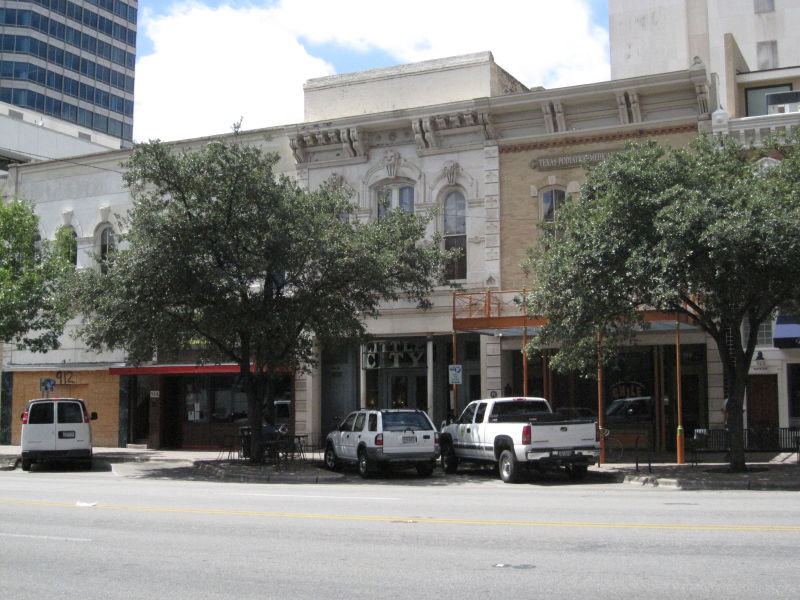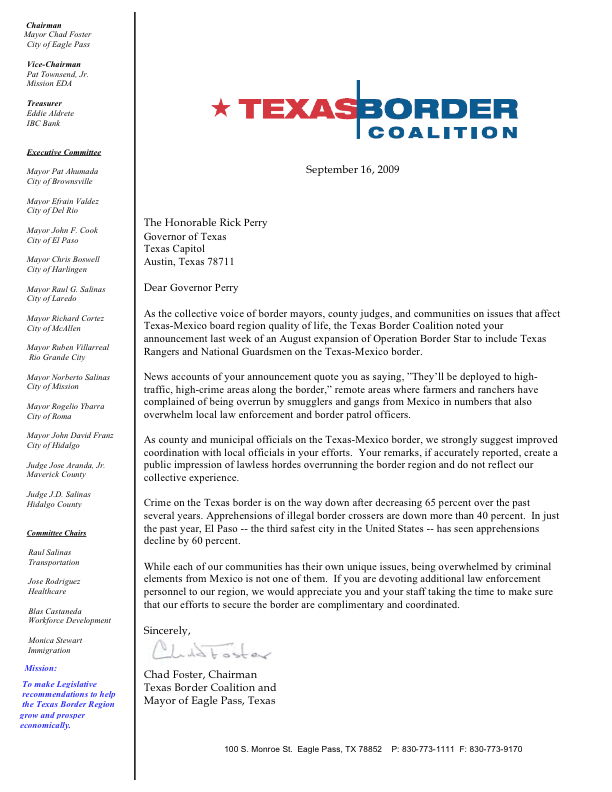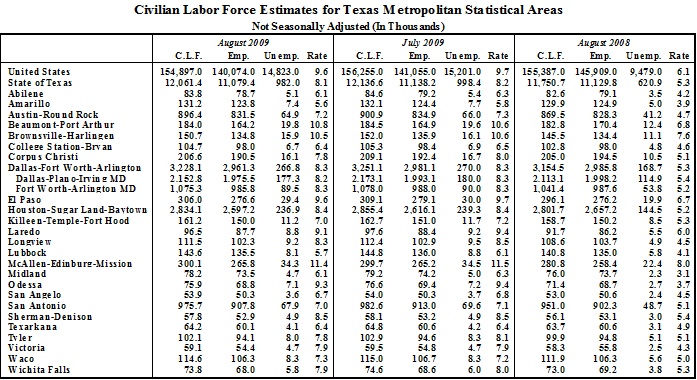The biggest contests on the 2010 ballot captivate Texas bloggers' imaginations this week. The Net's got room for smaller campaign fry, too, as well as a new liberal/progressive website. Closing it out is a lunch conversation with Karl Rove and other stories.
* * * * *
Call a Re-Dew
Lt. Gov. David Dewhurst sent out an official letter saying he's running for reelection. (Read our take here.) "Don't read too much into Dewhurst's non-move," cautions the Austin American-Statesman's First Reading, saying the Lite Guv has gotta do something to pass the time while he's waiting for U.S. Sen. Kay Bailey Hutchison to commit, and that something might as well be Lt. Governing.
BurkaBlog gives the following possible reasons for Dewhurst's announcement: KBH may not be resigning; Republican senators are conspiring in backrooms; and, over by the starting blocks, Attorney General Greg Abbott is gearing up. "If it's true and [Hutchison's] not resigning, well, Dewhurst's announcement suddenly makes heaps of sense," says Blue Dot Blues, following with speculation on what other folks down the ballot might do. (One of those, Rep. Dan Gattis, R-Georgetown, is aiming to take the place of retiring Sen. Steve Ogden, R-Bryan, says Blue Dot Blues after seeing a video on Gattis' website Sunday.)
Burka passed on a brief report from Texas Monthly's Pam Colloff about Gov. Rick Perry's yen for the Texas A&M bonfire that got a lot of attention from the traditional daily media this week. Meanwhile, Texans for Rick Perry are making lemonade out of their boss's secession talk by posting a video about "Texas: Succeeding." And the Houston Chronicle's Texas Politics features various videos from the Hutchison and Perry campaigns, here, here and here.
Hank Gilbert, a Democrat for governor, releases a response to Pres. Barack Obama's health care address to Congress, via WhosPlayin. (In brief, Gilbert says Hutchison and Perry are bad, health care reformers are good and the Texas Department of Insurance needs an overhaul, stat.) Elsewhere on the Internet, Eye on Wiliamson relays Gilbert's statements on Perry's border security initiative (to which they say, Boo!) and increasing funding for aspiring Tier One universities (to which they say, Yay!).
Purple Texas scoffs at reports that the Texas GOP is becoming more diverse because of candidates like Hutchison and Railroad Commissioner Michael Williams. The blogger says, "I don't know about you, but if the slim odds of Hutchison unseating Perry and a little-known black Republican winning a U.S. Senate seat are being used to argue that Republicans are getting more diverse, I'm falling a little short of being convinced."
Rightwingsparkle met former Solicitor General Ted Cruz, a candidate for Attorney General. She's a fan, we think. Her description of him includes words such as "young," "handsome," "serious," "inspiring," "good communicator" and "refreshing." And if you've been conjecturing that U.S. Trade Rep. Ron Kirk would make a good candidate for U.S. Senate, stop it right now, says the Dallas Morning News' Trail Blazers, because the former Dallas mayor doesn't want the job, saying, "I'm done."
Houston appellate judge Jeff Brown wants to follow fellow Republican Harriet O'Neill as the Place 3 holder on the Supreme Court, according to Tex Parte Blog. According to the same site, former Texas Supreme Scott Brister will have home court advantage Wednesday when he makes his first arguments since stepping down from the high court.
* * * * *
District Competition
Texas Watchdog shows off their multimedia cartography skills, creating an interactive map of information about state lawmakers, including campaign funding, pet bills and media reports. (Scroll down the page some to get info about statewide officeholders.)
Blue Dot Blues checks out the Republicans looking to dethrone freshman Rep. Diana Maldonado, D-Round Rock. The blogger counts four wannabes so far (not including 2008 GOP nominee Bryan Daniel or second-place primary finisher Dee Hobbs).
Rep. Norma Chavez, D-El Paso, is running again, "in case you had any doubt," NewspaperTree.com Blog reports, also posting the announcement of her campaign kickoff in El Paso (featuring Rep. Jessica Farrar, D-Houston, and Rep. Joaquin Castro, D-San Antonio).
Republican restaurateur Cindy Burkett (a former staffer for Sen. Bob Deuell, R-Greenville) is taking a shot at Rep. Robert Miklos, D-Mesquite. Capitol Annex relays part of her press release. Meanwhile, Rep. Aaron Peña, D-Edinburg, opened up a new district office in Edcouch, and has two posts all about it, here and here.
* * * * *
Dog Day
Texas politico Glenn Smith launched a new blog called Dog Canyon, featuring contributors Tom Block, Cyndi Hughes, Gregory Jackson, Mary Lowry, Turk Pipkin and Genevieve Van Cleve (Maldonado's 2008 campaign manager). First impressions-wise, the blog looks like it could be a sort of Texas-centric Huffington Post, or the type of site the parents of Burnt Orange Report would write. Either way or neither, Dog Canyon's got support from both predecessors.
Posts from the blog's first week include the first couple of installments of a "Texas Political Guidebook." Chapter One concerns the "Imbibius Age" of state politics. ("[T]he link between sobriety and good government can only be considered ironically," the blogger says.) Chapter Two is about "the orthodox spiritual practice of intolerance" the blogger says is prevalent in the state.
* * * * *
Gallimaufry
A Dos Centavos correspondent attended the Democratic National Committee meeting in Austin and brought back photos of people she thought were important, here and here.
Watchdog slams the Texas Alcoholic Beverage Commission for lack of transparency, then backs off a bit after receiving a response from a TABC spokeswoman, who wasn't contacted before Watchdog's criticism hit the blogosphere. And Grits rounds up coverage of the case involving Cameron Todd Willingham, who was falsely accused of arson and executed.
Burka had lunch with Rove. They talked about Rove's upcoming book, the Texas Tribune, the governor race, punditry, Obama, Chet Edwards and quail.
And Travis Monitor puts the finishing touches on their analyses of the constitutional amendments on the November ballot, writing about Propositions Eight, Nine, 10 and 11.
This edition of Out There was compiled and written by Patrick Brendel, who hails from Victoria but is semi-settled in Austin. We cherry-pick the state's political blogs each week, looking for news, info, gossip, and new jokes. The opinions here belong (mostly) to the bloggers, and we're including their links so you can hunt them down if you wish. Our blogroll — the list of Texas blogs we watch — is on our links page, and if you know of a Texas political blog that ought to be on it, just shoot us a note. Please send comments, suggestions, gripes or retorts to Texas Weekly editor Ross Ramsey.





